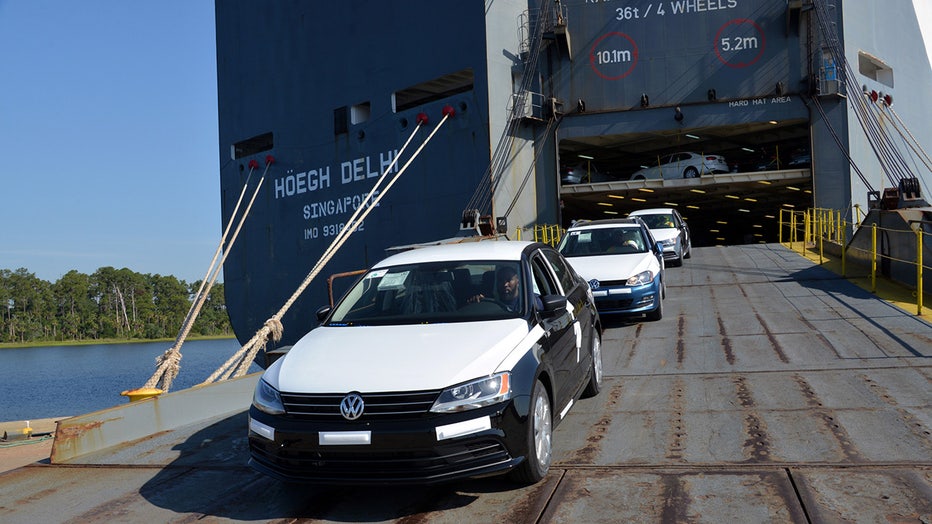List: The most and least American-made cars
Trump announces 25% tariffs on imported cars
Dr. Peter Earle with the American Institute for Economic Research joins LiveNOW's Andrew Craft to discuss President Trump's latest auto tariffs.
WASHINGTON - President Donald Trump’s 25% tariff on imported automobiles will hit some carmakers harder than others.
Vehicles that are made mostly in America, with American-made parts, will be hit the least. But overseas brands without much of a factory presence in the U.S. could see significant increases in cost.
Trump’s auto tariffs
The backstory:
President Trump announced long-awaited plans Wednesday to slap a 25% import tax on cars and trucks that are not made in the U.S. The goal, he says, is to encourage automakers to build factories in the U.S. while also providing revenue for the federal government.
By the numbers:
According to Reuters, which sourced data from research firm GlobalData, these carmakers import the highest percentage of their cars.
- Jaguar Land Rover (Tata) 100%
- Geely (Volvo): 90%
- Mazda: 81%
- Volkswagen: 80%
- Hyundai/Kia: 65%
- Mercedes-Benz: 63%
- BMW: 52%
- Toyota: 51%
- General Motors: 46%
- Stellantis (Alfa Romeo, Chrysler, Dodge, Fiat, Jeep, Maserati, Ram): 45%
- Subaru: 45%
- Honda: 35%
- Ford: 21%
- Tesla: 0%
By the model:
Every year, Cars.com releases their American-Made Index, using assembly location, parts content, engine origin, transmission origin and U.S. manufacturing workforce as datapoints. Because many foreign-owned automakers assemble cars in the U.S., the list of the most American-made vehicles includes some overseas brands.
This year’s list included:
- Tesla Model Y
- Honda Passport
- Volkswagen ID.4
- Tesla Model S
- Honda Odyssey
- Honda Ridgeline
- Toyota Camry
- Jeep Gladiator
- Tesla Model X
- Lexus TX

File: Longshoremen unload Volkswagen AG vehicles from a cargo ship at the Port of Jacksonville in Florida, U.S., June 18, 2015. (Mark Elias/Bloomberg via Getty Images)
Dig deeper:
The tariffs, which the White House expects will raise $100 billion in revenue annually, could be complicated. Some foreign-owned cars are already produced in the United States while others are partially built here using parts made both domestically and internationally. Still more are produced entirely overseas then shipped in to be sold. And even U.S. automakers source their components from around the world.
The tariffs would apply over time to both finished autos and parts used in the vehicles, the AP reported, citing a White House official who spoke on condition of anonymity.
Tariffs on imported cars are 'permanent,' Trump says
FOX 2 Detroit's Dave Kinchen joins LiveNOW's Christina Evans to break down how President Trump's auto tariffs could impact the auto industry in Michigan.
What they're saying:
The auto industry, markets, and international community had mixed reactions to the news.
"These tariffs are a major step in the right direction for autoworkers and blue-collar communities across the country," offered UAW President Shawn Fain. "And it is now on the automakers, from the Big Three to Volkswagen and beyond, to bring back good union jobs to the U.S."
"This is a very direct attack," Canadian Prime Minister Mark Carney said. "We will defend our workers. We will defend our companies. We will defend our country."
Shares in General Motors tumbled nearly 8% in Thursday morning trading. Ford's stock fell 3%. Shares in Stellantis, the owner of Jeep and Chrysler, dropped nearly 4%. But the stock prices of electric vehicle makers Tesla and Rivian were up.
Why you should care:
At least some economists say the cost of tariffs will be passed along to consumers. In this case, that will mean higher car prices for many models.
Cox Automotive said Wednesday that if there aren't tariff carve-outs for the auto industry's imports from Canada and Mexico, the cost of a U.S.-made vehicles would increase by about $3,000, while car prices for vehicles made in Canada or Mexico would rise $6,000.
"We’re looking at much higher vehicle prices," said economist Mary Lovely, senior fellow at the Peterson Institute for International Economics. "We’re going to see reduced choice. ... These kinds of taxes fall more heavily on the middle and working class.’’
The Source: Information in this story came from Reuters, which sourced data from GlobalData, and Cars.com, which performs its own annual review of auto assembly and parts sourcing. Reporting by FOX Business and Josh Boak of the Associated Press was also used, along with comments by President Trump at his Oval Office press conference Wednesday.

